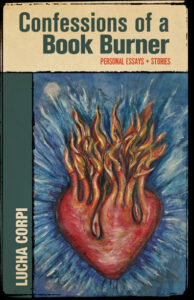 Corpi chosen as October 2014’s “Author of the Month” on Houston Public Media
Corpi chosen as October 2014’s “Author of the Month” on Houston Public Media
Houston Public Media radio host Eric Ladau interviewed Corpi for its website’s “Arte Público Press Author of the Month” feature, and along with the transcript, their conversation is available to listeners on the station’s interactive site through on-demand audio streaming here.
Click here to see all Arte Público authors featured on Houston Public Media.
About the Author:
LUCHA CORPI is an internationally renowned poet, novelist, and children’s book author. She is the author of several mystery novels published by Arte Público Press: Death at Solstice: A Gloria Damasco Mystery (2009), Eulogy for a Brown Angel (2002), Black Widow’s Wardrobe (1999), Cactus Blood (1995), and Crimson Moon (Arte Público Press, 2004). Loa a un angel de piel morena (2012) is the pioneering first installment in the Gloria Damasco Mystery series now available in Spanish. Her poetry collection, reissued by Arte Público Press in 2001, is entitled Palabras de mediodía / Noon Words (2001). A picture book for children, The Triple Banana Split Boy / El niño goloso (Piñata Books) was published in 2009. In her memoir, Confessions of a Book Burner: Personal Essays and Stories (Arte Público Press, 2014), she talks about the pivotal role reading and writing played in her life. Corpi is the recipient of numerous awards and citations, including a National Endowment for the Arts fellowship, the PEN Oakland Josephine Miles Literary Prize in fiction, and the Multicultural Publishers Exchange Book Award of Excellence in Adult Fiction. She was a tenured teacher in the Oakland Public Schools Neighborhood Centers Program for over 30 years.
About her latest book, Confessions of a Book Burner
 Writer and activist Lucha Corpi was four-years-old when she started first grade with her older brother, who refused to go to school without her. The director of the small school in Jáltipan de Morelos in the Mexican state of Veracruz knew the family, and he gave permission for the young girl to accompany her brother “just for a while.” She was given a desk in the back of the classroom, where she sat quietly in her little corner. Just as quietly, she learned to add and subtract, to read and write.
Writer and activist Lucha Corpi was four-years-old when she started first grade with her older brother, who refused to go to school without her. The director of the small school in Jáltipan de Morelos in the Mexican state of Veracruz knew the family, and he gave permission for the young girl to accompany her brother “just for a while.” She was given a desk in the back of the classroom, where she sat quietly in her little corner. Just as quietly, she learned to add and subtract, to read and write.
In this moving memoir, Corpi writes about the pivotal role reading and writing played in her life. As a young mother living in a foreign country, mourning the loss of her marriage and fearful of her ability to care financially for her son, she turned to writing to give voice to her pain. It “gave me the strength to go on one day at a time,” though it would be several years before she dared to call herself a poet.
Corpi’s insightful and entertaining personal essays span growing up in a small Mexican village to living a bilingual, bicultural life in the United States. Family stories about relatives long gone and remembrances of childhood escapades combine to paint a picture of a girl with an avid curiosity, an active imagination and a growing awareness of the injustice that surrounded her. As an adult living in California’s Bay Area, she became involved in the fight for bilingual education, women’s and civil rights.
In addition to examining a variety of topics relevant to today’s world—including race, discrimination, and feminism—Corpi relates riveting family tales of mountain men and cannibals, preachers and soothsayers, old-style machos and women who more than hold their own. These confessions offer an intriguing vision of the rich and complex world of an acclaimed poet and novelist.




